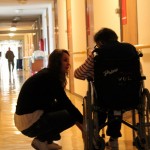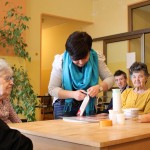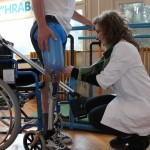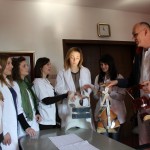Study curriculum | Accreditation [PDF]
Rationale
On the basis of article 6 of the Act on Health Care (Official Gazette no. 121/2003), on 7th April 2004the Government of Croatia brought the health care implementation plan. According to the plan it is indispensable to ensure proper conditions for the carrying out of health care activities at primary, secondary and tertiary levels. Adequate education of health professionals is needed for all health care levels based on instruction of European Union and World Health Organisation recommendations.
With regard to the above it has been concluded that properly trained occupational therapists are needed in all levels of health care in Croatia. Since 1996 to 2004 the increase of 47.4% in the number of employed occupational therapists has been reported. The increase in the number of occupational therapists in health and social care is caused by changes in health care system at primary, secondary and tertiary levels. In EU countries a significant increase in the number of employed occupational therapists has been reported. Since 1999 the increase of 25% has been reported in Spain, 20% in the Netherlands, 19% in Germany, 16% in Island, and 11% in Greece. In Croatia there are 0.8 occupational therapists per 100 000 inhabitants. The indicators clearly show the need to follow the European trends and their application in Croatia, both in terms of education of occupational therapists and terms of their employment possibilities.
Current Experiences with Similar Programs
A formal two-year education of occupational therapists at a higher educational level started in Croatia in 1986 at Zagreb School of Health Studies. It gradually evolved into a three-year study program, the implementation of which began in 1999. Such a program is still in force and is in accordance with the decisions of Sorbonne Declaration (1998) and Bologna Declaration (1999) concerning academic and professional harmonisation of education curricula in European countries. The end goal of occupational therapy study program at School of Health Studies in Zagreb is its harmonisation, i.e. the introduction of European dimension of knowledge in terms of knowledge, skills and people transfer and mobility.
Students’ Mobility
Professional study of occupational therapy is open to students from other similar study programs on educational institutions of higher level education in the country and abroad provided organisational and financial conditions are met (collaboration agreement). The students of professional study of occupational therapy are free to sign for courses and pass exams on other similar schools of higher education or university schools provided the collaboration conditions have previously been defined.
General information
Institutions of higher education in biomedical fields
Name of the Study
Professional study of occupational therapy
The title itself shows direct professional area included in the study program and also the types of job that the graduates are qualified to perform.
Institutions of higher education in biomedical fields
Duration
Three (3) academic years (6 semesters)
Each semester receives 30 ECTS, i.e. 180 ECTS for the three-year study program.
Admission Conditions
Fully completed four-year secondary school program and entrance exam plus certificate that there are no contra-indications to perform the selected profession.
Students of similar study programs in biomedical fields can also be enrolled.
Competences of Graduate Students, Job Skills and Opportunity for Continuing Education
The professional occupational therapist has acquired knowledge and skills important to identification of problems, definition of goals and planning of occupational therapeutic intervention, which may include the standard competences as defined by the following organisations: ENOTHE (European Network of Occupational Therapy in Higher Education) – Minimal Standards for Education of Occupational Therapists; WFOT (World Federation of Occupational Therapists), 1998; Croatian Occupational Therapists Association, 2005.
Competences of Graduate Students
Upon completion of study curricula a graduate occupational therapist is trained to do the following: occupational therapeutic assessment (identification of problems – components: motor sensory, cognitive, emotional and social; and environmental factors – physical, social and cultural in the activities of daily living); therapy planning; occupational therapeutic intervention (enabling the client to actively participate in the activities of daily living; the use of self-care appliances and facilities; recommendations about ergonomic adjustment of space; education of the client and the client’s family members), and evaluation.
Job Skills
The professional occupational therapist is trained and qualified to perform the jobs as described in chapter 2.5.1.
Opportunity for Continuing Education
There is a possibility to continue education in specialist 1 to 2 year study programs on institutions of higher education of biomedical fields (college or university).
Professional Title
Baccalaureate in occupational therapy (professional B.A.), or B. Sc, as defined by the new Act on Professional Titles and Academic Degrees.









